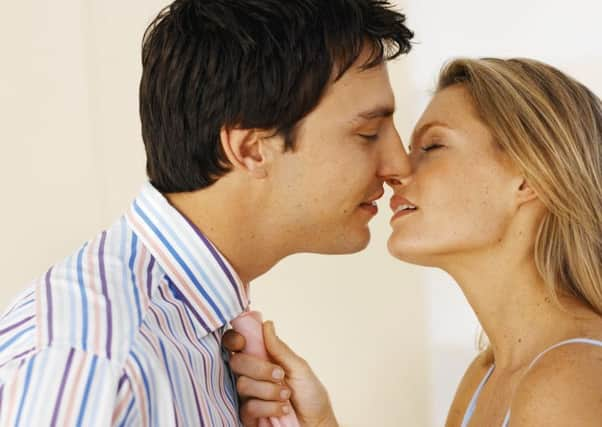Humans favour leaning to right when kissing study reveals


The research, by the universities of Dhaka, Bath and Bath Spa, found kiss recipients have a tendency to match their partners’ head-leaning direction.
Experts built on work from Western countries to investigate kissing behaviours in a non-Western context, including a bias for turning the head to one side.
Advertisement
Hide AdAdvertisement
Hide AdTheir work, published in the journal Scientific Reports, studied 48 married couples in Bangladesh, where romantic kissing is not typically observed in public.
Couples were asked to kiss privately in their own homes, then go into different rooms and independently report back on various aspects of the kiss.
Men were about 15 times more likely to initiate kissing than women, and both partners showed a bias for turning their heads to the right.
Dr Rezaul Karim, from the department of psychology at the University of Dhaka, said: “This is the first study to show sex differences in the initiation of kissing, with males more likely being the initiator, and also that the kiss initiators’ head-turning direction tends to modulate the head-turning direction in the kiss recipients.
“Based on our prior theoretical work we are also able to make new hypotheses about the underlying neural basis for these behaviours.”
The study found that more than two-thirds of kiss initiators and kiss recipients turned their heads to the right. Men accounted for 79 per cent of the kiss initiators.
A person being left- or right- handed predicted their head-leaning direction but this was only the case if they initiated the kiss.
The head-leaning direction of the kiss initiator also strongly predicted the head-leaning direction of the kiss recipient.
Advertisement
Hide AdAdvertisement
Hide AdThis suggests that the kiss recipients have a tendency to match their partners’ direction in order to avoid the discomfort of mirroring heads.
People who mirrored each other’s head movements on request for a kiss reported that they felt discomfort kissing in that way.
“This further suggests the underlying cognitive mechanisms of the act of kissing and head-turning,” the authors said. “Though this action tends to be performed intuitively, a decision must be made about the direction to which the partners should lean to kiss each other.”
The setting for the study was significant as kissing in Bangladesh is very private and censored from television or film, they added.